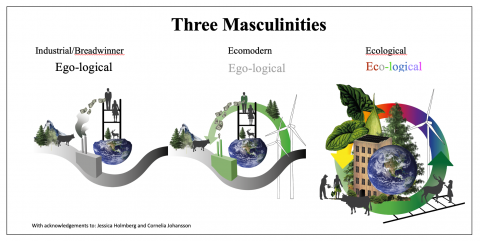
It goes without saying that we are in a pickle – both socially and environmentally. Global systems that support life are under threat from multiple angles. The ways that we relate to each other are polarising. COVID has changed life as we knew it. In fact, it’s reasonable to think that things are falling apart. For more than two decades, I have been wondering about what is at the root of our troubles. I’ve come to see that beneath the selfishness of global economic systems, lays a deeper problem. And its hierarchical and gendered; in fact, its masculinist.
To be clear, I am not saying that our social and environmental problems are all men’s fault. Yes, some men are the worst social and environmental actors. But the root cause I am most interested in is the ways we train all people of all gender identities to manifest certain types of masculinities within them. The masculinities that seem to be the most rewarded and therefore encouraged in us all are life destroying; they are aggressive, domineering, competitive, assertive, they operate through entitlement and offense as the (supposed) best form of defence. These forms of masculinities are what we saw at the stairs of US Congress on 6th January 2021. They are the same masculinities that we see in open-pit mines. They are the same masculinities that produce the plastics that end up in the Great Pacific Garbage Patch, or childishly ridiculing the opposition on the Parliament floor. These masculinities ego-logical; they set us apart from each other and put blocks between us and our millennia-long animal origins in and of this Earth. They are made-up identities that are not who we really are as people or as a species. There are two destructive forms of masculinities; one is characteristics of those who own the means of production and those who work for them that are desperately seeking self-security through the possession and control of stuff. I call these industrial/breadwinner masculinities. Then there’s the masculinities that offer tepid responses to our pickle; they attempt to regulate and contain and yet can’t quite cut free from the systems that created our problems in the first place. I refer to these as ecomodern masculinities, exemplified by the kinds of values and actions that render the COPs (the global Conference of Parties to address Global Heating) so ineffective. If we look to the healthiest of ecosystems for guidance in order to create a different way forward, what we see are intricate webs of complex relationships that ensure that energy flows for all of life in iterative cycles of birth and death; that at its very foundations, life is all about relationships; not always kind, but always life sustaining in the broadest of ways.
From these insights, I was motivated to come up with a response, which lead to the development of ecological masculinities – a diverse way to think about and manifest more care in the world. Ecological masculinities is a new field of study, education and activism that is based on the core premise that masculinities are plural and possess infinite capacities to care for Earth, others and ourselves at the same time. In recent years a growing number of activists, allies and colleagues have been lending their smarts and passions to find new ways for us to think about and manifest a relational world. The kinds of masculinities I am talking about here still protcitive and providing, but they are deeply, broadly and widely caring; they are located not separate above but are part of and immersed in complex living systems throughout society and environment. These kinds of masculinities might seem “queer” – they are contemplative, wise, paused, expansive, attentive, aware, present, authentic, localised, felt, ancient, they point us away from industrial-dominator models towards what is quite the opposite to strange. Ecological masculinities are in fact a masculinities version of the most normal way of being in a heterogenous world.
Paul Pule:
MenAlive Australia